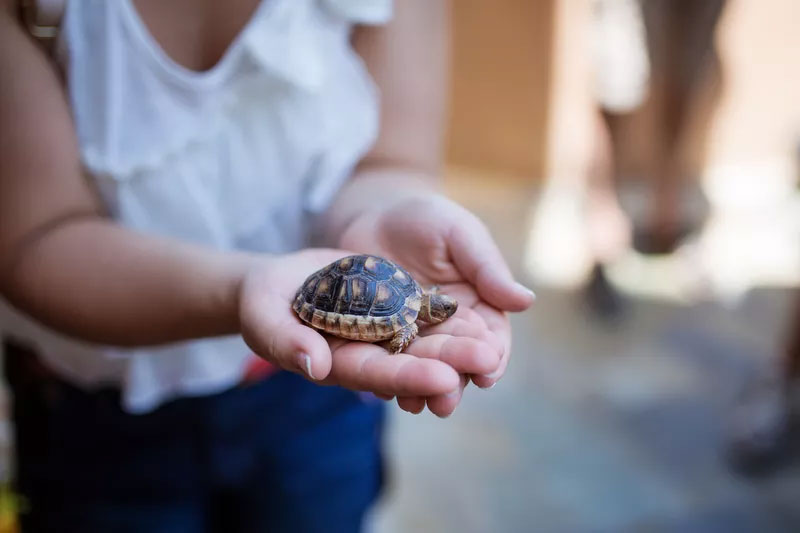7 Family Pets That Could Make You Sick
Published on August 02, 2022

The Centers for Disease Control and Prevention (CDC) is warning about salmonella in small turtles. The warning comes amid an outbreak of the disease that has resulted in at least 15 reported cases across 11 states, including five hospitalizations.
Cats and dogs might be the most common pets in the U.S., but sometimes kids want something a little more exotic—and often parents give in to their pleas.
If your child is desperate for a pet with a hard shell rather than a furry coat, think twice before bringing a small turtle into your home. Not only is it against the law to sell these little guys as pets, but they could also make you sick.
Why Small Turtles Carry Salmonella
According to the CDC, several people in the current outbreak said they purchased turtles with shells less than four inches long before they got sick. Three purchased their turtles from a website called myturtlestore.com.
Although it’s against federal law to sell or distribute turtles of this size as pets, they can be found illegally online and at stores or flea markets.
Even a turtle that looks clean and healthy can carry salmonella germs in their waste. This is true for pet turtles of any size, not only the small ones. If the germs spread to the turtle’s body, anyone who touches it can get sick if they subsequently touch their mouth or food without washing their hands. The germs can also spread to the turtle’s tank water and anything else the creature might come into contact with.
Common salmonella symptoms are diarrhea, fever, and stomach cramps. These can start within a few hours of swallowing the salmonella germs, but sometimes the onset takes up to six days.
Other Pets That Can Make You Sick
It’s not just tiny turtles that could make you or your child sick. Other reptiles, like lizards and snakes, baby chicks, ducklings, fish, and amphibians, such as frogs and salamanders, can also carry the salmonella bacteria. If you have young children under 5, the CDC advises against getting any of those types of animals as pets. If you take your child to a petting zoo or fair, let them look but not touch!
It’s a parent’s responsibility to choose the right pet for the home, and a big part of that is considering the pet and its needs in the context of the family, says Adrianna Bravo, MD, FAAP, pediatrician and senior medical advisor for Inspire Diagnostics.
Reptiles and Amphibians
Lizards, snakes, and frogs are popular pets in the U.S. but they sometimes harbor germs that could make family members sick. The bacteria mycobacterium marinum mainly affects fish but can affect reptiles and amphibians. This type of bacteria can cause skin lesions on humans.
Rodents
Hamsters, gerbils, guinea pigs, rats, and mice are popular family pets but they also carry a risk of spreading infection. Diseases that may be directly transmitted by rodents kept as pets include Campylobacteriosis, which can cause diarrhea, nausea, and stomach cramps; Leptospirosis, with symptoms that include high fever, chills, muscle aches, nausea, and a rash; and Lymphocytic choriomeningitis (LCMV). Although rare, LCMV could cause similar symptoms but also affect the brain and spinal cord.
Birds
Pet birds can spread infections including cryptococcosis, histoplasmosis, and psittacosis. However, it’s rare for people to get sick from these infections. Those most at risk for serious illness are infants, adults over age 65 years, and people with weakened immune systems.
Fish
Fish and aquarium water can spread germs to people, but illness due to keeping fish is rare. As long as you care for your fish and their aquarium and don’t let children under age 5 handle or touch aquariums or aquarium water or feed fish without supervision, you can enjoy your little swimmers without worrying about the spread of disease.
Can Dogs or Cats Make My Child Sick?
If pet dogs and cats are properly cared for, are up to date with immunizations. and receive appropriate veterinary care when required, they’re unlikely to make your child sick.
There are some potential health issues to be aware of, says Texas-based veterinarian Sara Ochoa, DVM, a veterinary consultant for doglab.com.
“Washing your hands after playing with your pet and before you eat will help keep your family safe and healthy.”
— SARA OCHOA, DVM
“There are a few diseases that can be transferred from your dog or cat to a person,” Dr. Ochoa says. “Things like ringworm, scabies and eye infections are mild issues that can spread from dogs or cats.”
Leptospirosis is a bacteria that dogs can pick up from coming into contact with the urine of an infected animal. If your pooch has Leptospirosis, it can be spread to any family members who clean up accidents in the home, according to Dr. Ochoa.
Pet cats may become infected with Campylobacteriosis or cat tapeworm. Cat scratch disease (caused by the bacteria Bartonella henselae), is most common in young cats and cats that hunt. Up to half of cats have been exposed to the bacteria at some point in their lifetime. Anyone can get sick from cat scratch disease, but it’s most common in children and adolescents under age 15.
Who’s Most At Risk for Disease from Animals?
Children younger than 5 years old, people with weakened immune systems, and people 65 years of age and older are more likely to get diseases spread between animals and people (also known as zoonotic diseases).
Pregnant women are also at a higher risk for some animal-related diseases. If you’re pregnant, the CDC advises against adopting a new cat or handling stray cats due to the parasite toxoplasmosis, which can cause birth defects. Don’t worry about getting rid of your current cat, but give someone else the responsibility of handling the litterbox.
Pregnant women should also avoid contact with pet rodents to prevent exposure to lymphocytic choriomeningitis virus, which can cause birth defects. Avoid direct contact with the rodent (and delegate cleaning duties of its habitat) during your pregnancy.
How to Stay Healthy Around Pets
Without a doubt, the best way to keep your kids safe around your pet is to be super vigilant about hand-washing.
“Even healthy pets can carry germs that can make people sick,” says Dr. Bravo. “Often, children and household members can get sick from simply touching the pet or the pet’s environment and then touching unwashed hands to the mouth or food.”
Always wash hands with soap and water right after touching or feeding a pet, interacting with the pet’s environment, handling the pet’s food or water, or cleaning up pet waste. “Adult supervision of children’s handwashing is especially important,” says Dr. Bravo. When hand washing isn’t possible, use hand sanitizer.
It’s also important to keep pet habitats and supplies (tanks, toys, feeding containers, and pet bedding) clean to help reduce germs and their risk to humans.
“Clean supplies away from the kitchen or areas where human food is handled,” Dr. Bravo says. “And don’t forget to follow up with a good cleaning and disinfection of the area where the pet and supplies were cleaned. With smaller pets, it is important to routinely keep the pet off areas where human food is prepared or eaten. “
Take extra caution with pet feces and excrement, because pet poop can contain germs and parasites that are harmful to humans.
“Be sure to clean up and remove pet excrement using gloves or bags, dispose of the excrement properly, and wash hands right away,” says Dr. Bravo. “Be sure to keep young children away from areas where pet excrement may be located, such as particular fields, pet-designated park areas, and uncovered sandboxes.”
Studies have found that children who grow up in homes with pets may enjoy better health. One small study, published in Pediatrics, suggests that children living with dogs had fewer respiratory tract infections during the first year of their lives. This study also suggests that infants who live with pets could have better resistance to infectious respiratory illnesses throughout their whole childhood.9
Other possible health benefits of pets include lowering anxiety and stress levels (through snuggling with or stroking the pet) and improving cardiovascular fitness through regular walks and active play.
What This Means For You
Pets can provide wonderful emotional and mental health benefits to families with children, but choosing a pet for your home is a big decision. If your pet will be around young children, older people, immunocompromised, or pregnant people, avoid fish, birds, rodents, reptiles, and amphibians. These animals can spread germs to people that can cause diseases like salmonella.
To keep your child healthy around pets, make good hand washing habits a priority. Meanwhile, a healthy pet reduces the risk of spreading illness to your family, so schedule regular veterinary visits, keep your pet up-to-date on the preventive care it requires (such as vaccines, deworming, and flea and tick control), and notify your veterinarian as soon as your pet shows signs of being ill or sick.


:max_bytes(150000):strip_icc():format(webp)/Claire_Gillespie_headshot-649830869f1e4a4ca8979b90a304ffa0.jpg)
